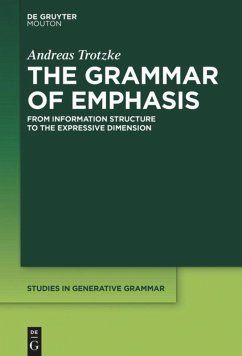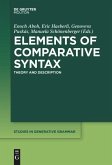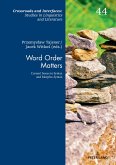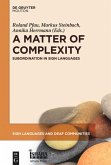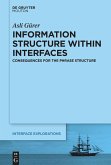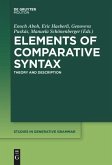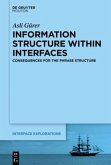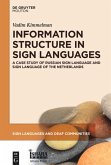This book reconsiders the linguistic notion of emphasis. For many, the concept of emphasis is confined to information structure. However, our understanding of the grammatical reflexes of emphasis is only partial as long as the expressive side of utterances is not taken into account. The book explores similarities, differences, and interactions between information structure and the expressive dimension of language in the domain of natural language grammar.
Specifically, this monograph demonstrates that specific word order options, sometimes in combination with discourse particles, yield meaning effects that are typical for the expressive side of utterances and endow them with an exclamative flavor. Approaching this issue from a syntactic point of view, the book shows that there are syntactic categories (e.g., a certain class of particle verbs) and word orders (e.g., certain fronting patterns involving discourse particles) that directly connect to expressive meaning components. The work presented in this monograph combines theoretical analysis with experimental evidence from both perception and production studies.
Specifically, this monograph demonstrates that specific word order options, sometimes in combination with discourse particles, yield meaning effects that are typical for the expressive side of utterances and endow them with an exclamative flavor. Approaching this issue from a syntactic point of view, the book shows that there are syntactic categories (e.g., a certain class of particle verbs) and word orders (e.g., certain fronting patterns involving discourse particles) that directly connect to expressive meaning components. The work presented in this monograph combines theoretical analysis with experimental evidence from both perception and production studies.
"This book is a pleasure to read because, beyond its empirical achievements of distribution and analysis, it presents a discussion before the explicit background of an intellectual approach to the empirical problems of emphasis and the inventory of mirative effects in German. [...] The book is well-organized, in succinct style and, consequently, without undue redundancy. [...] Covering contents as spread and fathoming deeply as the present book on 192 pages is a model for future readers' manageability."
- Werner Abraham, Folia Linguistica 2018; 52(2): 535-542
- Werner Abraham, Folia Linguistica 2018; 52(2): 535-542

